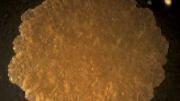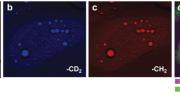Science
Discover the scientific breakthroughs and engineering innovations being pioneered across Harvard’s labs and centers.
Bioengineering Report Released
Among the report's major recommendations are the hiring of a minimum of 20 new faculty members in the joint field and the creation of undergraduate and graduate curricula...
What Stress Reveals
Biologist Susan Lindquist investigates how HSP90 (heat-shock protein 90), a protein chaperone, provides a molecular mechanism that may help explain punctuated equilibrium in evolution...
Hubble space telescope photographs explained
The cosmic drama, as seen from a vantage in space: Harvard astronomers highlight important images taken by the Hubble Space Telescope
Where Does Tuberculosis Hide?
The fight against an ancient scourge shifts to new battlegrounds...
Joanna Aizenberg
A bioengineer learns from sponges...
Catching Some Rays: Good for Your Heart?
CBS News has the story on a new study, led by Harvard School of Public Health professor Edward Giovannucci, that found that men with low Vitamin D levels had more than double the risk of heart attack...
Update: Chemistry Professor Wins Prize for Imaging Techniques
Professor of chemistry and chemical biology X. Sunney Xie, whose work is detailed in the cover story of our current issue, has won the Berthold Leibinger Research Prize for laser technology...
Climate Change Solutions?
Electrochemcial weathering: a new CO2 mitigation strategy...
Shedding Light on Life
The scenes are familiar from biology textbooks. A long string of DNA is copied to form a matching strand. A virus infects a cell by stealing through its membrane.
Light Makes a Comeback
Today’s high-powered light microscopes bear little resemblance to the iconic instruments of high-school biology labs. This revolution...






